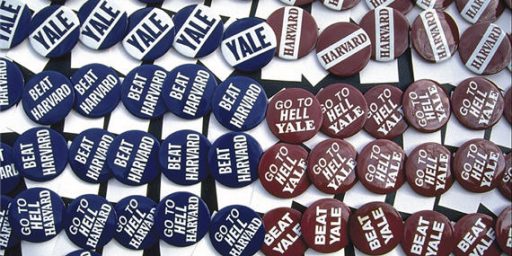ELITE SCHOOLS AND MONEY
Aaron Haspel points to recent studies showing that students who graduate from elite colleges do not earn higher incomes than their peers who could have gone to those schools but chose instead to go to a less prestigious school. Craig Henry reacts thusly:
For at least a generation, college costs have risen faster than inflation. Students and parents spend savings and take on debt in order to attend expensive, elite colleges to get a leg up on the competition. Yet, it appears that elite colleges do not deliver that advantage.
If a private business acted this way, they would be in the sights of class-action lawyers and probably subject to congressional hearings. Certainly “60 Minutes” or “Dateline” would do their best to “investigate”.
Except that universities aren’t in the business of guaranteeing the incomes of its graduates. Indeed, aside from the more vocational-technical schools within these colleges (engineering, business, etc.), university education isn’t designed to train people for jobs. One could, in theory, graduate Harvard University and then make the economically irrational decision to intern for a low circulation magazine rather than become, say, a Wall Street trader. That wouldn’t be Harvard’s fault.






James, I agree 100,000% When I went to Caltech, a lot of the students wanted to be academics. Fair to say that those of us who became academics make less money than those that didn’t. Seems to me top caliber schools yield a higher percentage of people that go into academia. Another aspect is that extremely bright people often end up doing quirky things. I have a classmate who ended up becoming a dog musher.
I never thought of my experience as being contingent on a monetary pay back. It was kind of like people who were in the military. They had an experience that granted them wisdom and wisdom like that pays off in a non-monetary way.
In over a decade in the high-tech industry, the brightest engineers I have run into have been from schools I never heard of or “run-of-the-mill” state schools.
It took a while to figure out that MIT and Stanford don’t have any secret engineering or science classes that aren’t taught everywhere else, and that an engineering degree from one of the “top’ schools doesn’t make these people smarter or better engineers.
What they DO is provide a better network, especially if you are going into business or the like. So if all you are going to do is sit behind a computer and design, or come up with exotic recipes for building semiconductors, etc. then it really doesn’t matter where you get your degree. If you are going to start a business or go into a field where networking is an advantage, then these schools will be more helpful.
I earned my BSC at DePaul and my MBA at Stanford, so I’ve had experience with both an elite university and a non-elite university. I agree that the network is a very important advantage of an elite school, both in that there are fellow alumni who will answer e-mails, etc., and in that the name of the school itself opens doors even with non-alumni.
With regard to the quality of education itself, DePaul was far more demanding in the sense that the university had no hesitation to fail a student whose work wasn’t up to par, while Stanford was quite reluctant to. On the other hand, the material itself was more difficult at Stanford, and I learned far more from my classmates there, because they were both smarter and better-educated.
My experience accords with the observation that graduates of elite schools are more likely to give less weight to income in making career choices, but I’m dealing with a small sample.
Jim: Also, you’re comparing graduate and undergraduate education. My limited experience is that, even at the same institution, professors will grade undergraduates more rigorously. Indeed, it’s very, very hard to get less than a “B” in a graduate course. The trick is to get admitted to the program.
Fair point, James, although it seemed to be nigh impossible for an undergraduate to flunk out of Stanford thirty years ago when I was in graduate school there, and the situation seems to be the same today. In fairness, I don’t have any direct experience on this, and I’m not quite sure whether statistics would be a lot of help, either.
—